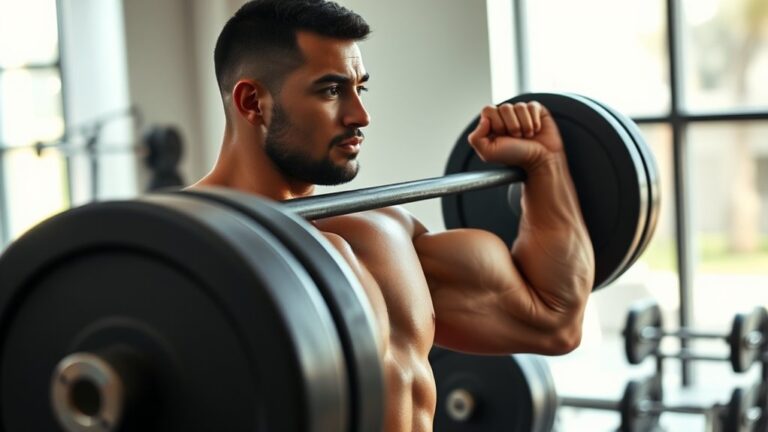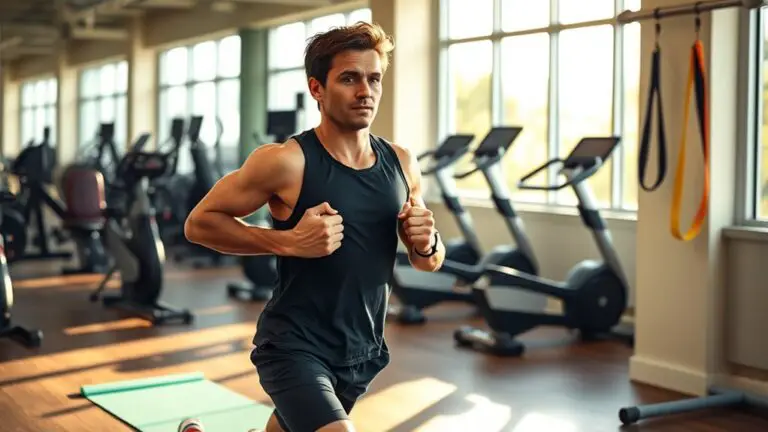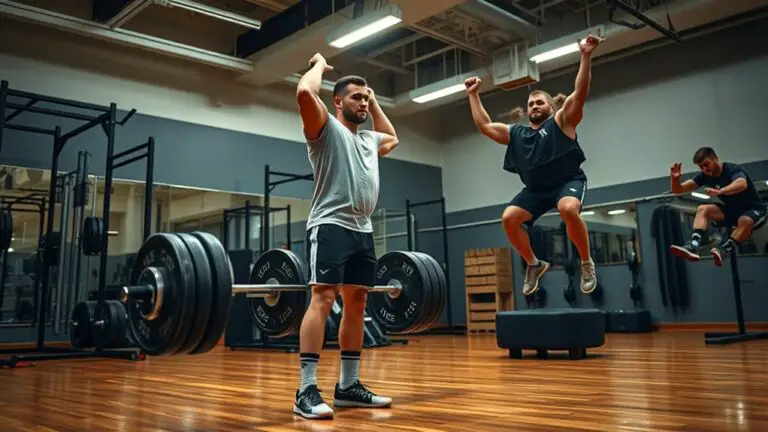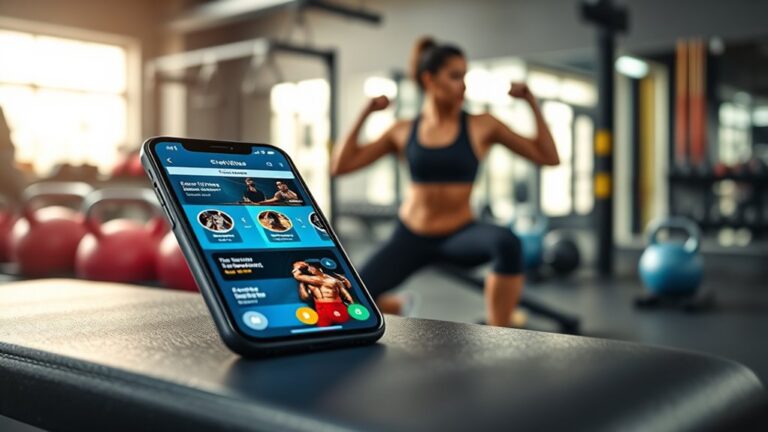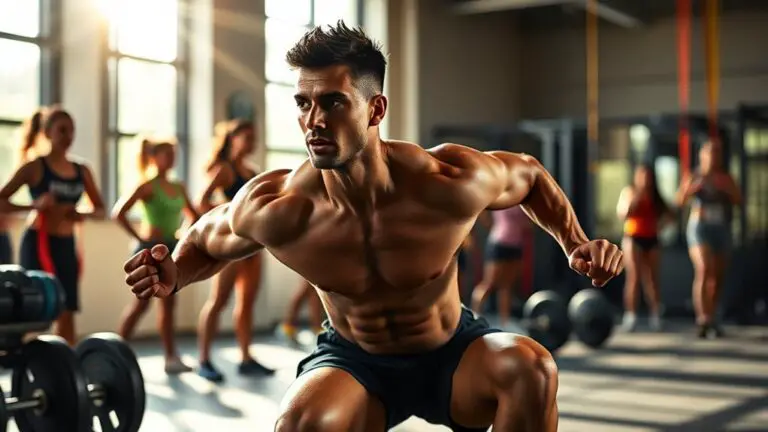How to Hydrate Properly for Strength and Endurance
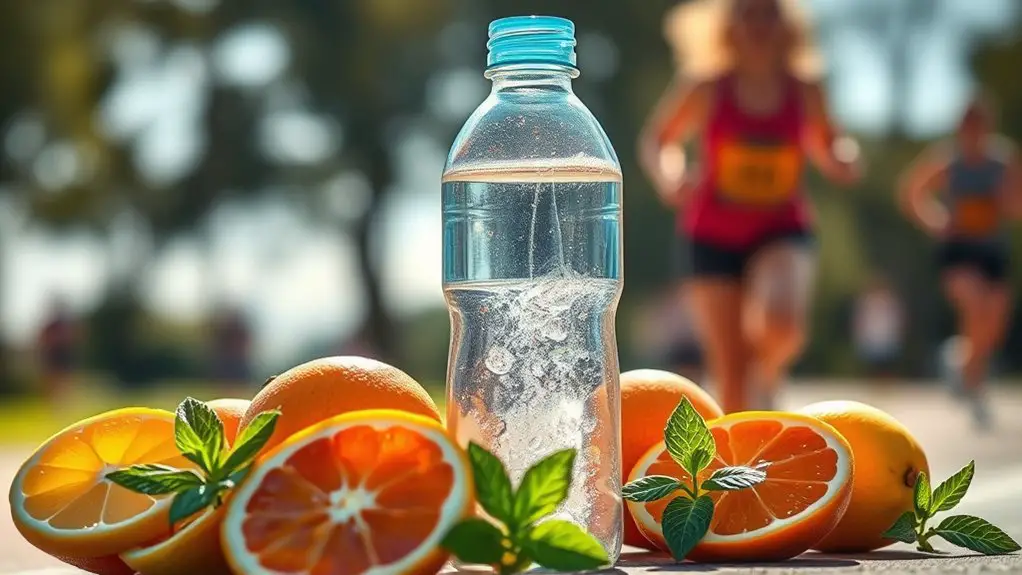
To hydrate properly for strength and endurance, drink 16-20 ounces of water two hours before exercise. Sip 8-10 ounces during the last 30 minutes prior. After working out, replenish 16-24 ounces for every pound lost. Consistently consume water throughout the day, aiming for at least half your body weight in ounces. Remember that electrolytes play an essential role in performance, so choose drinks or foods rich in minerals. There’s much more to explore about optimizing your hydration strategy.
The Importance of Hydration for Athletic Performance
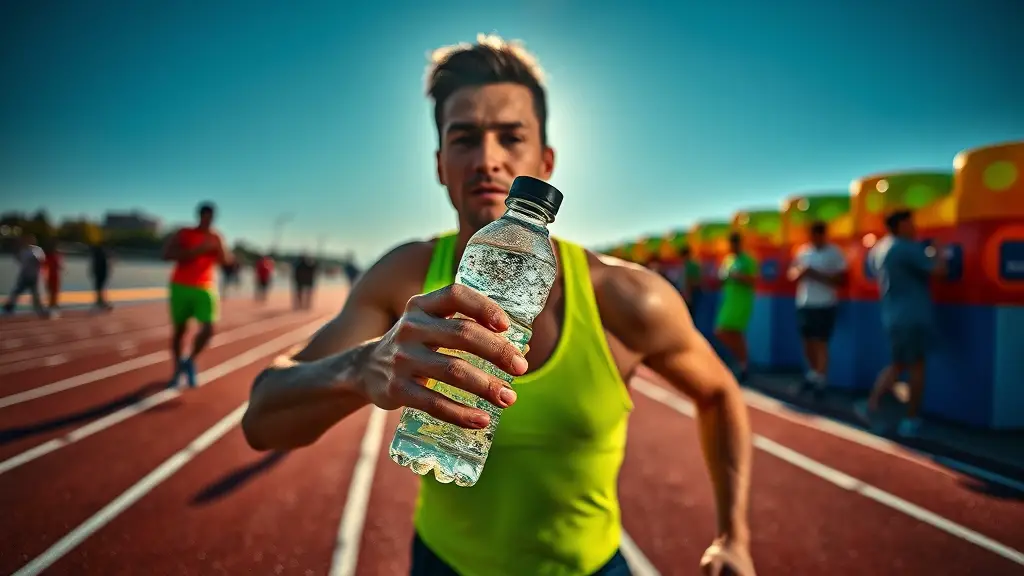
When you’re pushing your limits in sports or exercise, staying hydrated is essential for maintaining peak performance. Many athletes fall prey to hydration myths, believing that drinking only when thirsty is sufficient. In reality, thirst isn’t always a reliable indicator of your body’s hydration needs, especially during intense activity.
Hydration technology has evolved, providing devices and apps that help you monitor fluid intake more accurately. These tools can analyze sweat loss and recommend hydration strategies tailored to your workout intensity and duration.
Moreover, staying hydrated not only prevents fatigue but also enhances strength and endurance. Dehydration can lead to decreased performance, muscle cramps, and increased risk of injury. Aim to drink water consistently before, during, and after exercise to guarantee ideal hydration levels. By debunking hydration myths and utilizing technology, you’ll set yourself up for success in your athletic endeavors.
Understanding Your Individual Hydration Needs
How can you determine your unique hydration needs? Start by considering factors like your body weight, exercise intensity, and environmental conditions. Research suggests that individual needs can vary greatly; some may require more fluids during workouts, while others might need less. A practical approach is to monitor your urine color—aim for a light yellow, which indicates proper hydration.
Additionally, pay attention to how you feel during exercise; fatigue or dizziness might signal you’re under-hydrated. Tailoring your hydration strategy to your personalized hydration needs is essential for peak performance.
You can also use sweat tests to estimate fluid loss during workouts, helping you adjust your intake accordingly. By understanding your unique hydration requirements, you’ll be better equipped to maintain strength and endurance throughout your training. Remember, it’s not a one-size-fits-all approach; listen to your body and adjust as needed.
When and How Much to Drink Before, During, and After Exercise

To optimize your performance, it’s essential to know when and how much to drink before, during, and after your workouts. Start hydrating well before you exercise, aiming for about 16-20 ounces two hours prior, and continue sipping during your session to replace lost fluids. After your workout, focus on rehydrating with appropriate fluids to recover effectively and maintain strength.
Pre-Exercise Hydration Tips
Staying properly hydrated is essential for optimizing your performance and recovery during exercise. Aim to drink water or a sports drink about 16-20 ounces at least two hours before your workout. If you’re having pre-exercise snacks, consider consuming them alongside your hydration; this can help with energy and absorption. During your last 30 minutes before exercise, sip on another 8-10 ounces to top off your hydration levels. Using hydration tools like bottles with measurement markings can help you track your intake. Remember that everyone’s needs vary, so listen to your body and adjust accordingly. Proper pre-exercise hydration sets the stage for success, ensuring you’re primed for strength and endurance when it’s time to perform.
Post-Exercise Rehydration Strategies
Once you’ve completed your workout, rehydrating effectively is essential for recovery and performance. Aim to drink about 16–24 ounces of fluid for every pound lost during exercise to optimize post-exercise recovery. Start rehydrating as soon as you finish working out, focusing on hydration timing to replenish fluids lost through sweat. Electrolyte-rich drinks can be beneficial, especially after intense sessions, as they help restore sodium and potassium levels. If you’ve exercised for over an hour, consider a sports drink for quicker recovery. Don’t forget to continue hydrating throughout the day, aiming for at least half your body weight in ounces. This approach not only helps with recovery but also prepares you for your next workout.
The Role of Electrolytes in Hydration
Electrolyte balance is essential for maintaining hydration and optimizing your performance during exercise. When you sweat, you lose important minerals like sodium, potassium, and magnesium, which can affect your strength and endurance. To replenish these electrolytes, consider incorporating sources like sports drinks, fruits, and vegetables into your hydration strategy.
Importance of Electrolyte Balance
While many people focus solely on water intake for hydration, maintaining a proper balance of electrolytes is equally important for ideal performance and recovery. Electrolytes play significant roles in muscle function, nerve signaling, and fluid balance. An electrolyte deficiency can lead to fatigue, cramps, and decreased endurance, while an electrolyte imbalance can impede your overall performance.
Here are four key electrolyte functions to keep in mind:
- Regulate muscle contractions: Essential for preventing cramps and ensuring efficient movement.
- Support nerve function: Crucial for communication between the brain and muscles.
- Maintain fluid balance: Helps in retaining hydration levels during workouts.
- Aid in recovery: Facilitates quick replenishment post-exercise to enhance recovery.
Stay mindful of these aspects to optimize your hydration strategy.
Sources of Electrolytes
To optimize hydration and enhance performance, it’s important to contemplate where to get your electrolytes. Natural sources like fruits and vegetables are excellent, with bananas and spinach being rich in potassium. Coconut water is a popular choice, providing a rejuvenating alternative to sugary sports drinks. If you’re looking for convenience, sports drinks and hydration tablets can replenish electrolytes effectively during intense workouts. For tailored options, DIY electrolyte drinks made with water, salt, and citrus can be both cost-effective and healthy. Additionally, electrolyte supplements are available for those needing an extra boost. Whatever source you choose, ensuring adequate electrolyte intake is key to maintaining balance and maximizing your strength and endurance.
Signs of Dehydration to Watch For
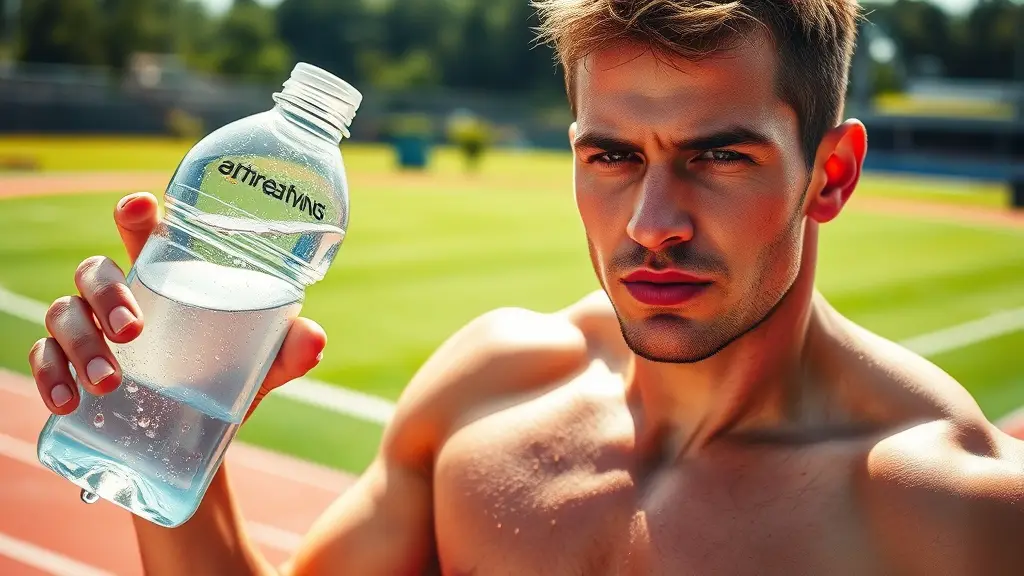
Recognizing the signs of dehydration is essential for maintaining your strength and endurance during physical activities. Being aware of dehydration symptoms can help you respond quickly and effectively. Here are some key hydration indicators to watch for:
- Thirst: If you feel thirsty, your body is already signaling that it needs more fluids.
- Dark Urine: A darker shade often indicates dehydration; aim for light yellow urine.
- Fatigue: Feeling unusually tired or sluggish may be a sign that you’re not properly hydrated.
- Dizziness: Experiencing lightheadedness during activity can be a clear signal that you need to drink more water.
Tips for Maintaining Hydration Throughout the Day
Staying hydrated throughout the day is essential for maintaining ideal strength and endurance, especially if you’re active. Here are some practical tips to help you keep your hydration on track:
| Time of Day | Hydration Reminder | Suggested Amount |
|---|---|---|
| Morning | Drink a glass of water when you wake up | 8 oz |
| Mid-Morning | Set a reminder to drink again | 8 oz |
| Lunch | Have water with your meal | 12 oz |
| Afternoon Snack | Refill your water bottle | 8 oz |
Incorporate hydration reminders into your daily routine and consider using water tracking apps to monitor your intake. Aim for at least half your body weight in ounces daily. By making hydration a priority, you’ll support your performance and overall health.
Frequently Asked Questions
Can Certain Foods Help With Hydration Levels?
Imagine your body as a sponge, enthusiastically soaking up every drop of hydration. Certain foods can indeed boost your hydration levels, acting as nature’s little reservoirs. Water-rich fruits like watermelon, cucumbers, and oranges are fantastic hydrating foods. They not only quench your thirst but also provide essential vitamins and minerals. Incorporating these fruits into your diet can keep you refreshed and energized, enhancing your overall well-being and performance throughout the day.
How Does Climate Affect Hydration Needs?
Climate greatly affects your hydration needs. In warmer temperatures, you sweat more, leading to increased fluid loss. Humidity effects can make this worse, as high humidity prevents sweat from evaporating efficiently, causing you to lose even more fluids. Temperature fluctuations can also impact your body’s hydration levels; during colder months, you might not feel as thirsty, but your body still needs water to function well. Staying aware of these factors is essential for maintaining proper hydration.
Are Energy Drinks Better Than Water for Hydration?
Think of your body as a finely tuned machine; it needs the right fuel to run smoothly. While energy drinks can offer hydration benefits through electrolytes and carbohydrates, they often come with sugars and caffeine that might lead to a crash. For everyday hydration, water’s simplicity can’t be beaten. If you’re engaging in intense workouts, energy drinks can be beneficial, but moderation is key. Always prioritize water for balanced hydration.
Can I Overhydrate, and What Are the Risks?
Yes, you can overhydrate, and it’s important to be aware of the risks. When you drink too much water, it can lead to water toxicity, diluting your body’s electrolytes. Common hydration symptoms include headaches, nausea, and confusion. In extreme cases, it can result in hyponatremia, a serious condition where sodium levels drop dangerously low. To avoid this, monitor your intake, especially during intense workouts, and listen to your body’s signals.
Does Caffeine Impact My Hydration Status?
Caffeine does impact your hydration status, but not as much as hydration myths suggest. While it’s a mild diuretic, studies show that moderate caffeine intake doesn’t greatly lead to dehydration. Instead, it can enhance performance during workouts. If you’re consuming caffeine, just make sure you’re also drinking enough water. Balance is key; staying hydrated is essential, and caffeine can be part of your routine without compromising your hydration.
